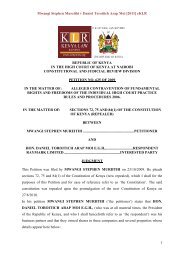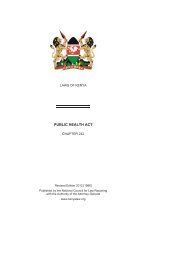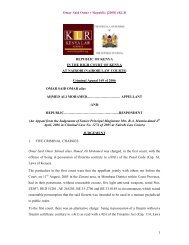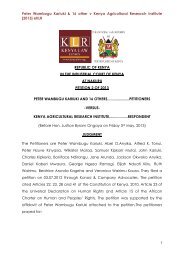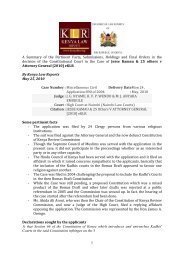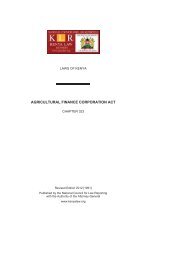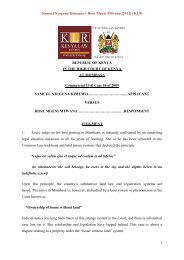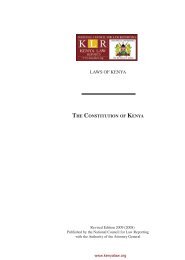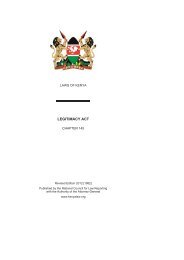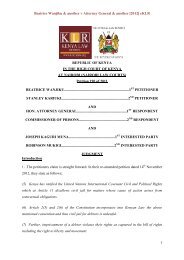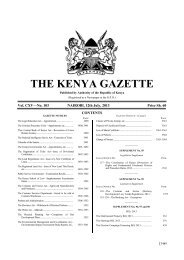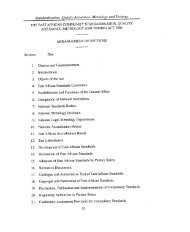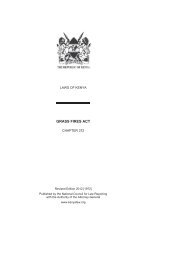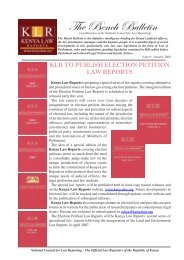Bench Bulletin - Issue 12 - Kenya Law Reports
Bench Bulletin - Issue 12 - Kenya Law Reports
Bench Bulletin - Issue 12 - Kenya Law Reports
Create successful ePaper yourself
Turn your PDF publications into a flip-book with our unique Google optimized e-Paper software.
KENYA LAW REPORTS<br />
BENCH BULLETIN<br />
FEATURE CASE<br />
Findings<br />
• The general and overarching principle of constitutional law as entrenched in Section 70 of our Bill of Rights<br />
(Fundamental Rights and Freedoms of the Individual) is that the personal law of one community, religious<br />
or otherwise, cannot override or qualify the Bill of Rights - fundamental rights guaranteed under the<br />
Constitution.<br />
• The doctrine of separation of Church and State provides that as between the State and religion each had its<br />
own sphere, the former of law making for the public good, and the latter moral welfare of individuals and their<br />
God or creator.<br />
• The court did not have jurisdiction to strike out section 66 of the Constitution even if it contradicted section<br />
82 of the Constitution. However, there are some provisions of the Constitution which are superior to others.<br />
For instance the Bill of Rights, which are also referred to as universal, inherent and natural rights, cannot be<br />
taken away by the State. In addition the courts have the jurisdiction to declare conflict or inconsistency in the<br />
constitutional provisions, or to declare whether or not the provisions are in conflict with any values, principles<br />
or purposes of a democratic constitution such <strong>Kenya</strong>’s.<br />
• The court would not have a role in the alteration of section 66 of the Constitution or any other section of the<br />
Constitution. The process of altering the section or indeed any other provision of the Constitution lay with the<br />
National Assembly. Whereas an amendment may be challenged in court once enacted into law, only Parliament<br />
has the necessary legislative mandate to alter the provision by way of amendment provided the provisions of<br />
section 47 on amendments are satisfied. The applicant’s prayer to declare section 66 of the Constitution void<br />
was therefore not tenable and it would be declined.<br />
• The Judicature too was a creature of the Constitution, and whereas it has power to interpret any provision of<br />
the Constitution (under sections 67, 84 and <strong>12</strong>3(8) of the Constitution), that power is limited to interpretation<br />
and constitutional judicial review but not alteration of the Constitution. Under its constitutional judicial review<br />
jurisdiction the court may grant a declaration in the event of conflict of provisions.<br />
• Parliament does not have the power to take away the basic structures of the constitutional ‘sanctum’ - the<br />
Bill of Rights, the security of tenure of Judges, which is the cornerstone of the rule of law, and the democratic<br />
provisions of Section 1A of the Constitution. Secondly, it is only the people who can enact a new constitution.<br />
• Since the drafters of both the Independence Constitution and the amendments thereto had in mind the<br />
territory that comprised the former Protectorate, it cannot be said that it was a mere error or omission when<br />
they retained language in the Constitution that the Kadhi’s courts were clearly restricted to operate within the<br />
former Protectorate which by definition extended to the ten miles beyond the Indian Ocean shoreline. For the<br />
Kadhis’ Courts Act, though well intentioned, to purport to extend the jurisdiction of Kadhis’ Courts to Nyanza<br />
and Western Provinces, Rift Valley, Central, Eastern Provinces and Nairobi, areas well beyond the former<br />
Protectorate, is clearly in breach of Section 179 (4) of the Independence Constitution, that is, Section 66(4) of<br />
the current Constitution.<br />
• The entrenchment of section 66 establishing the Kadhis’ Courts in the Constitution is certainly inconsistent<br />
with section 65 which grants Parliament power to establish other courts subordinate to the High Court. Section<br />
66 favoured one religion in preference to other faiths, Christianity, Hindu, Buddhist, Bohras, and Indigenous<br />
religions and culture.<br />
• Section 78 of the Constitution provides for freedom of religion, for a person to manifest and propagate his<br />
religion or belief, in worship, practice and observance, at his own expense. This provision covers all religious<br />
communities, including Muslims and that being the anchor provision on freedom of worship and the observance<br />
of religion, section 66(4) of the Constitution on Kadhis’ courts was superfluous. Territorial jurisdiction at this<br />
time and age curtails the freedom of worship or religion.<br />
• Section 4(2) (b) of the Kadhis’ Courts Act was inconsistent with section 66(4) of the Constitution and was<br />
therefore void to the extent of the inconsistency.<br />
• Section 66 of the Constitution on Kadhis’ courts was inconsistent with the secular nature of the state. The<br />
section does not advance the values and principles of the constitution which characterize a secular state.<br />
• The real anchor of freedom of worship and conscience in <strong>Kenya</strong> is not Section 66 of the Constitution but Section<br />
78, and for this reason, Section 66 is superfluous and does not add or offer any additional rights not covered<br />
by section 78 which applies to all faiths in <strong>Kenya</strong>. On the contrary at this time and age it restricts the operation<br />
of Kadhis’ courts to the ten mile former Protectorate whereas section 78 has no such territorial restriction<br />
as regards freedom of conscience religion, or worship etc. Section 66 is also in conflict with section 65 of the<br />
Constitution which contemplates subordinate courts of universal application in the Republic of <strong>Kenya</strong>.<br />
30<br />
<strong>Issue</strong> <strong>12</strong>: April-June 2010



